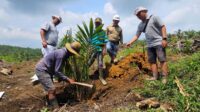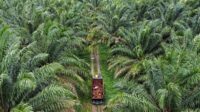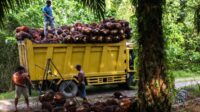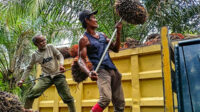PALMOILMAGAZINE, PASER — The Palm Oil Plantation Fund Management Agency (BPDPKS) under the Ministry of Finance, in collaboration with the Directorate General of Plantations (Ditjenbun) at the Ministry of Agriculture and PT Citra Widya Education (CWE), officially launched a Harvest and Post-Harvest Technical Training program for smallholder oil palm farmers in Paser Regency, East Kalimantan.
Held on August 11–15, 2025, the training gathered 93 participants from batches IV, V, and VI. The initiative is part of the Human Resource Development Program for Palm Oil Plantations (SDM PKS), designed to enhance farmers’ technical skills, managerial capacity, and environmental awareness in order to meet increasingly strict global palm oil industry standards.
Over five days, participants engaged in classroom sessions, interactive discussions, technical simulations, and field visits to PT AJP’s plantations, which already implement industry-standard harvest and post-harvest practices. The hands-on experience provided farmers with real-world applications of the theories studied.
Also Read:
Nugroho Kristono, Director of PT CWE, highlighted palm oil’s importance as a national pride and a backbone of Indonesia’s foreign exchange. Of the country’s 16.38 million hectares of oil palm plantations, 42% are managed by smallholders. “We hope participants can take this knowledge home and share it with fellow farmers, so the benefits spread wider,” Nugroho said in an official statement received by beige-heron-208544.hostingersite.com on Thursday (Aug 14, 2025).
Paser’s Head of Agriculture and Livestock Office, Djoko Bawono, noted that this was the final training for 2025, with 550 farmers trained throughout the year. For 2026, the local government has proposed 1,134 participants from 11 cooperatives across 139 villages and five urban wards. “Almost all farmers in Paser grow oil palm. Developing human resources in this sector is our top priority,” Djoko stressed.
Joining virtually from Jakarta, Director of Oil Palm and Other Palma Crops, Baginda Siagian, emphasized that palm oil remains Indonesia’s largest export earner, contributing IDR 464 trillion. However, average smallholder yields remain at only 3 tons per hectare—well below the optimal potential of 5–6 tons. “This productivity gap is a challenge we must tackle together,” he said.
Baginda added that technical training is crucial to improve harvesting skills, post-harvest handling, and plantation management. He also underlined the importance of the upcoming B50 biodiesel program—which requires high-quality CPO—making farmers’ role critical.
Looking ahead, the training will expand beyond harvesting and post-harvest practices to cover cultivation, ISPO (Indonesian Sustainable Palm Oil) compliance, and downstream processing. “This way, farmers can better understand value-added opportunities and unlock broader business prospects,” Baginda noted.
The program is expected to serve as a catalyst for boosting productivity and sustainability among smallholders. The knowledge carried home by participants is anticipated to spread across their communities, creating a domino effect that strengthens collective farmer capacity. Ultimately, the initiative aims to nurture independent, competitive, and sustainable smallholder palm oil plantations. (P2)





































